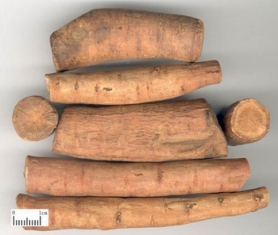Selected Commonly Used Formulas with White Peony (Bai Shao Yao)
White Peony (Bai Shao Yao, 白芍藥)
In the PPRC, White Peony is listed as the dried root of Paeonia lactiflora Pall. (Fam. Ranunculaceae). The nature of White Peony is slightly cool, its flavor is bitter and sour, and it homes to the Liver and Spleen channels. It functions include pacifying the Liver, relieving pain, nourishing the blood, regulating the menses, as well as astringing Yin and checking perspiration. White Peony is indicated for headache and dizziness, pain in the rib-sides and abdomen, spasms and pain in the arms and legs, blood deficiency with a sallow complexion, menstrual irregularities, spontaneous sweating, and night sweats.

Commonly Used Formulas with White Peony
(Jia Wei Xiao Yao San, 加味逍遙散)
Herbs & Actions
Dang Gui & Bupleurum Formula (Xiao Yao San, 逍遙散), consisting of Bupleurum (Chai Hu, 柴胡), Chinese Angelica (Dang Gui, 當歸), White Peony (Bai Shao Yao, 白芍藥), Atractylodes (Huai Niu Xi, 懷牛膝), Hoelen (Fu Ling, 茯苓), Roasted Ginger (Wei Jiang, 煨薑), Mentha (Bo He, 薄荷), and Licorice (Gan Cao, 甘草), soothes the Liver, strengthens the Spleen, and harmonizes the Ying Qi. Gardenia (Shan Zhi Zi, 山梔子) clears the heat from the three Warmers (三焦), and Moutan (Mu Dan Pi, 牡丹皮) clears blood heat.
Functions
Soothes Liver Qi, strengthens the Spleen, nourishes the blood, and clears heat.
Indications
Traditional: Stagnation of Liver Qi with blood deficiency and heat manifested by irritability, anxiety, hypochondriac pain, lassitude, reduced appetite, tidal fever, spontaneous sweating or night sweating, headache, dry eyes, flushing-up, dry mouth, palpitation, irregular menstruation, abdominal pain, and painful and difficult urination.
Modern: Menopausal disturbance, menstrual irregularity, leukorrhea, endometriosis, chronic hepatitis, early stage of cirrhosis, cholecystitis, cholelithiasis, peptic ulcer, leukoderma, dysmenorrhea, infertility, pelvic inflammation, urethritis, and pruritus senilis.
Dang Gui & Ginseng Eight Combination
(Ba Zhen Tang, 八珍湯)
Herbs & Actions
Dang Gui Four Combination (Si Wu Tang, 四物湯), consisting of Chinese Angelica (Dang Gui, 當歸), Cooked Rehmannia (Shu Di Huang, 熟地黃), White Peony (Bai Shao Yao, 白芍藥), and Ligusticum (Chuan Xiong, 川芎), supplements the blood and promotes blood circulation. Four Major Herb Combination (Si Jun Zi Tang, 四君子湯), consisting of Ginseng (Ren Shen, 人參), White Atractylodes (Bai Zhu, 白朮), Hoelen (Fu Ling, 茯苓), Licorice (Gan Cao, 甘草), tonifies Qi and strengthens the Spleen. Jujube (Da Zao, 大棗) and Fresh Ginger (Sheng Jiang, 生薑) harmonize the Spleen and Stomach.
Functions
Tonifies Qi and supplements the blood.
Indications
Traditional: Both Qi and blood deficiencies marked by pale and sallow complexion, dizziness, blurred vision, lassitude and sluggishness, fatigue, shortness of breath, palpitation, reduced appetite, a pale tongue with thin and white coating, and a thready and weak or big and forceless pulse.
Modern: Anemia, irregular menstruation, chronic ischemic cardiomyopathy, thrombocytopenic purpura, habitual abortion, pruritus senilis, and postoperative weakness.
Peony & Licorice Combination
(Shao Yao Gan Cao Tang, 芍藥甘草湯)
Herbs & Actions
White Peony (Bai Shao Yao, 白芍藥) and Licorice (Gan Cao, 甘草) nourish the blood and Yin with sour and sweet flavors, and alleviate spasms and pain.
Function
Nourishes Yin with sour and sweet flavors, and alleviates spasms and pain.
Indications
Traditional: Muscle spasms and pain in the lower extremities or abdominal pain du to blood or body fluid deficiency.
Modern: Either skeletal muscle or smooth muscle spasms and pain; shoulder stiffness in the elderly; toothache, sciatica, trigeminal neuralgia, intercostals neuralgia, systremma, dysmenorrhea, peptic ulcer, and night-crying in infants.
(Dang Gui Shao Yao San, 當歸芍藥散)
Herbs & Actions
Chinese Angelica (Dang Gui, 當歸) nourishes and activates the blood, and alleviates pain. White Peony (Bai Shao Yao, 白芍藥) nourishes the blood, softens the Liver, and alleviates pain. Ligusticum (Chuan Xiong, 川芎) promotes the flow of both Qi and blood. White Atractylodes (Bai Zhu, 白朮) and Hoelen (Fu Ling, 茯苓) augment the Qi, strengthen the Spleen, dry dampness, and promote urination. Alisma (Ze Xie, 澤瀉) promotes urination to remove dampness.
Functions
Nourishes the blood, soothes the Liver, strengthens the Spleen, and removes dampness.
Indications
Traditional: Disharmony between the Liver and Spleen (Liver blood deficiency and Spleen dysfunction with damp retention) during pregnancy marked by continuous dull pain in the abdomen, difficult urination, ankle edema, sallow and lusterless complexion, and fatigue.